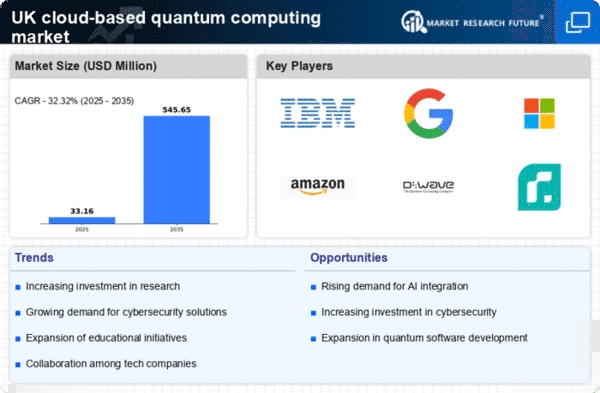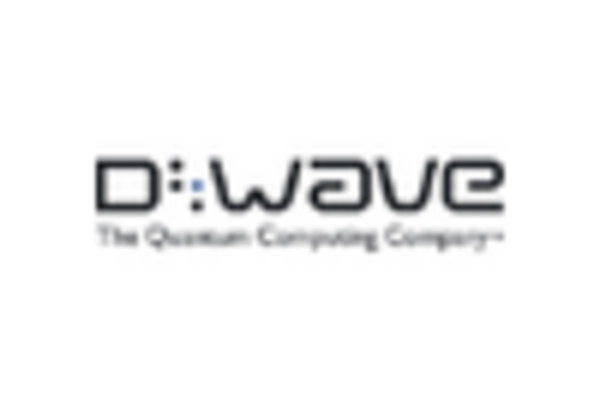Government Initiatives and Funding
The UK government has been actively promoting the development of quantum technologies, which significantly impacts the cloud based-quantum-computing market. Initiatives such as the National Quantum Technologies Programme aim to foster research and development in quantum computing, providing substantial funding to startups and established companies alike. This governmental support not only enhances the technological landscape but also encourages private sector investment. In 2025, the UK government allocated £300 million to quantum research, reflecting its commitment to positioning the country as a leader in quantum innovation. Such initiatives are expected to create a conducive environment for the growth of the cloud based-quantum-computing market, attracting both domestic and international players.
Increased Collaboration Among Tech Giants
The cloud based-quantum-computing market is witnessing increased collaboration among major technology companies in the UK. These partnerships often focus on developing innovative quantum solutions and expanding service offerings. For instance, collaborations between established tech firms and quantum startups are becoming more common, facilitating knowledge transfer and resource sharing. This trend is likely to enhance the capabilities of cloud based-quantum-computing services, making them more accessible to a broader range of industries. As these collaborations evolve, they may lead to the creation of new applications and services that could further stimulate market growth. The combined expertise of these entities is expected to drive advancements in quantum algorithms and hardware, ultimately benefiting the cloud based-quantum-computing market.
Growing Interest in Quantum Security Solutions
As cyber threats become increasingly sophisticated, the cloud based-quantum-computing market is seeing a growing interest in quantum security solutions. Quantum cryptography, which leverages the principles of quantum mechanics to secure data transmission, is gaining traction among businesses concerned about data privacy and security. The potential for quantum technologies to provide unbreakable encryption methods is particularly appealing to sectors such as finance and healthcare, where data integrity is paramount. In 2025, it is estimated that the market for quantum security solutions in the UK could reach £500 million, highlighting the urgency for organizations to adopt these advanced security measures. This trend is likely to drive further investment in the cloud based-quantum-computing market as companies seek to safeguard their digital assets.
Rising Demand for Advanced Computing Solutions
The cloud based-quantum-computing market is experiencing a surge in demand for advanced computing solutions across various sectors in the UK. Industries such as finance, pharmaceuticals, and logistics are increasingly seeking to leverage quantum computing capabilities to solve complex problems that traditional computing cannot efficiently address. This demand is driven by the need for faster data processing and enhanced analytical capabilities. According to recent estimates, the market for quantum computing in the UK is projected to reach £1.5 billion by 2026, indicating a robust growth trajectory. As businesses recognize the potential of quantum technologies to optimize operations and drive innovation, investment in cloud based-quantum-computing solutions is likely to escalate, further propelling market growth.
Emergence of Quantum Talent and Education Programs
The cloud based-quantum-computing market is benefiting from the emergence of specialized education and training programs aimed at cultivating quantum talent in the UK. Universities and research institutions are increasingly offering courses and degrees focused on quantum computing, which is essential for developing a skilled workforce capable of driving innovation in this field. The establishment of dedicated research centres and partnerships with industry players is also contributing to the growth of expertise in quantum technologies. As the demand for skilled professionals rises, it is anticipated that the cloud based-quantum-computing market will experience accelerated growth, with a more knowledgeable workforce ready to tackle the challenges and opportunities presented by quantum computing.
















